What is reality?
Continuing Day 1, morning, 2nd session
Alex
There’s nothing but fermions and bosons.
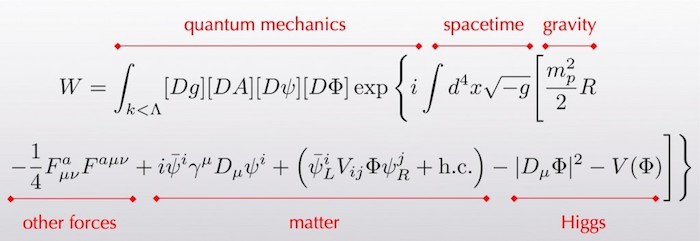
Physics has not yet bottomed out, but we don’t have to know the fundamental ontology (string theory or otherwise). Perhaps it won’t ever bottom out. Naturalism doesn’t require us to take sides on matters at the frontiers of physics. Naturalism can trust two (three) features of physics to not change (despite possible future revolutions):
- Resolute denial of teleology: no backward causation from the future pulling events in some trajectory, or any eminent causation that involves some kind of representation of what the future must be like. The denial of purpose and goals in physics: no sucessor theory to the succession of theories since Newton is likely to include any scope for teleological causal processes.
- Second law of thermodynamics: generates the time asymmetries in physics. Further, all the asymmetries in physics are a result of the time asymmetries. (Ryan: really? maybe.)
- Reductionism: is a metaphysical thesis that denies downward causation; physics is causally closed. The explanatory power of the special sciences are an epistemic thesis and not a metaphysical one, and represent cognitive limitations of humans and no fundamental facts about the organization of reality.
(Ryan)
I think Alex goes too far with his last points about reductionism. Emergent facts about reality are still facts, interesting, and arguably metaphysically real, albeit not in the same way as (more) fundamental physics. I agree that we should emphasize that reductionism means that there is no downward causation.
Let us label Alex’s position that tends to deny the reality of ontologies that emerge or supervene on physics as eliminative reductionism.

Sean
If we buy that particle physics has no teleology in it, is it nevertheless useful to talk about emergent phenomena as having teleological explanation? The length of the neck of the giraffe has a purpose, for example.
Alex
Sure, we can help ourselves to that vocabulary, but we should acknowledge that we are engaging in a somewhat misleading set of metaphors, similar to the issue of “design” in evolutionary biology. But if we were to ignore this distinction, we would miss the big difference between Aristotilian and Newtonian mechanics.
Don
You (Alex) are committed to the view that “physics fixes all the facts”. But fundamental physics does not address all the facts, and the most interesting facts are the ones that are the most general. What you mean is that if we had a computer that could in principle calculate all the fundamental physics (Laplace’s demon) then we could derive all the facts of the special sciences. It’s very hard for me to see what could constitute evidence for that claim. That looks like a statement of metaphysical faith. We should be a little bit verificationist.
(Ryan)
I agree Don has clarified the issue of what reductionism entails, but he shouldn’t be skeptical about it, as we verify that physics is causally closed every time we look for new experimental effects beyond it.
Perhaps it’s worth defining a concept of entailment to denote the claim that a description of reality in terms of fundamental physics fixes the higher-level claims of the special sciences. Is there a difference between “A reduces to B” and “B entails A?”
Steven
Why should we have this kind of philistinism? Is the manifest image something that makes sense and is permissible to us? Sure. Barack Obama is real and Santa Claus is not, and not for reasons that require particle physics.
Why should we not use this kind of principled philistinism of refusing to think deeply, but using “real” the way we use other terms in our everyday life. Why shouldn’t we do this in physics or science also. Is there really a philosophical discontinuity between the kind of reasoning we do in everyday life and science that makes this kind of naive view of reality impermissible in one where it is useful in the other.
Further,
Everyone in this room has used the word “real” in an unreflective, unphilosophical, unsophisticated way and I don’t see any reason for barring its use in the sciences also.
I took a philosophy course from Max Black at Cornell, whom whenever asked if something is real, said the answer is “yes.”
Temperature is real; protons are real; the constitution is real; this newspaper is real; but real in different ways.
Dan
I agree with you (Steven). We should remember that there is another camp of philosophers (and scientists) that say that the manifest image is what is real and causal (has hegemony), and the posits of physics are instrumentalist fantasies.
“Quantum particles: the dreams that stuff is made of” – David Moser
Now, we as naturalist are committed to the ontology of the physical sciences, but we shouldn’t go to the other extreme and deny the reality of the manifest image.
We can count the glasses on the table.
Alex
(Back-pedaling) That’s not a thesis I was defending. There’s nothing but fermions and bosons… and everything that is made up of fermions and bosons. The physical facts fix all the facts. There are also chemical facts, biological facts, economic facts. But if you fix the relations of the fermions and bosons in one chunk of spacetime the same as another, then you get all the same emergent phenomena as well. However, you won’t have the same historical facts, following the points from the thought experiment called “Swampman.”
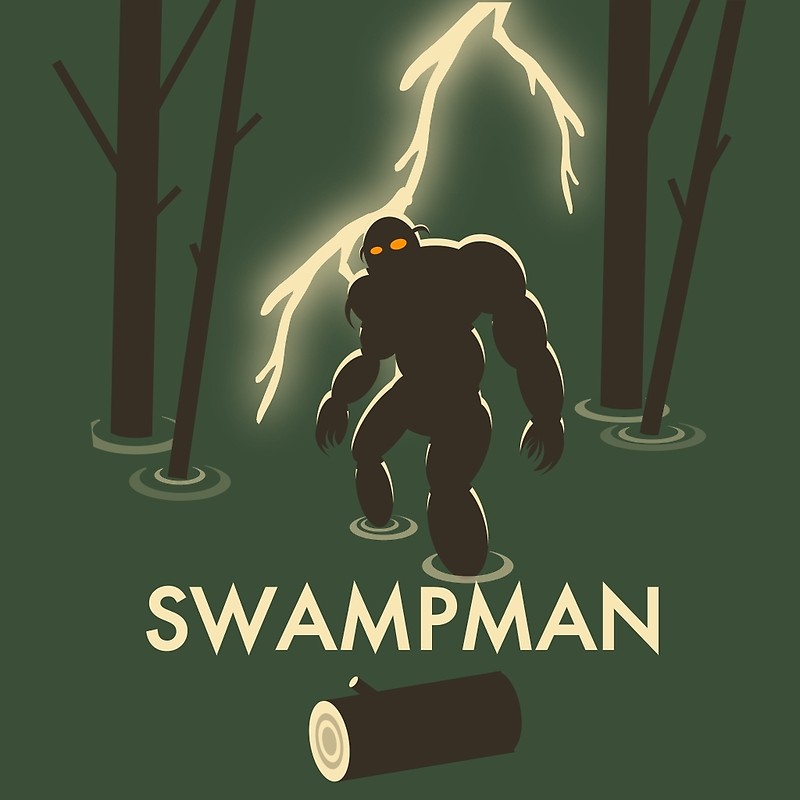
Steven
I suppose you would say The Constitution of the United States, not the paper it’s printed on but the ideas it represents, is real because it exists in the brains of people.
Alex
To first approximation.
Sean
What about the Schrödinger equation?
\[\begin{equation} \label{eq:schrodinger_equation} i \hbar \: \frac{\partial}{\partial t} | \psi \rangle = \hat{H} | \psi \rangle \end{equation}\]
Alex
I agree, and several others have pointed out, the ontology of mathematical relations is perplexing.
The biggest problem for me philosophically is: what is the metaphysics and epistemology of mathematical truths?
Terrence
To what extent is this not a Cartesian view, in which you have just given up half the world? … There’s the teleological stuff, and it’s all just illusion.
(Ryan)
Not sure, but what I think Terrence is getting at is that Alex’s skepticism about higher ontology and the manifest image can be seen as being analogous to Descartes’ radical skepticism about information from his empirical senses. I’m assuming he’s implying that a more thorough reflection (in the scientific realist sense) would recognize realism at higher levels? Perhaps he’s arguing that some of it may even be teleological??
Alex
Some, like Dan, will say that teleology is a garden variety causal process that involves blind variation and natural selection operating at many different levels and using many different mechanisms to produce adaptation. Not only that, we should also recognize that Darwin naturalized teleology and purpose, giving the real causal mechanism underlying it. Darwin showed that there is not any teleology in nature, it’s all just an overlay.
Steven
I have to agree with you (Alex) because so much of the progress in the history of science has been in removing teleology from explanation, for example, in Aristotle’s physics and in the biology before Darwin.
Dan
As communicators of science, we have a political obligation to not be misunderstood. Richard agrees with you (Alex) that there isn’t any biological design in nature and coined the term designoid, meaning apparently designed, however, I think this is a mistake.
Two Harvard medical students in a bar were discussing the marvels inside a single cell. One of them says to the other, “How can evolution possibly be true?”
There’s an idea out there that evolutionary biologists should downplay the marvelousness of nature. “There’s no design in nature; examples of brilliant biological design are an embarrassment to science.” But what evolution accomplishes is often stupendously clever. Evolution should be properly called a design process and can be contrasted with pseudo design, being cases where there appears to be design with function but its actually noise, such as Sidney Harris’ comic with a blackboard filled with fake physics scribbled on it that is really meaningless.
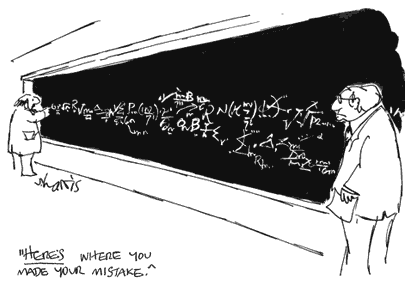
Biological design is typically better than what engineers can achieve (in terms of optimization, energy efficiency, etc.).
I thought the design of the genetic code was pretty bad.2
Alex
The more you look into it, the more you realize how good the design is given the constraints. We could talk about that more, but moving on…
The political implications of naturalism give me pause. In 1860, on hearing the suggestion that mankind was descended from the apes, the wife of the Bishop of Worcester is said to have exclaimed,
My dear, descended from the apes! Let us hope it is not true, but if it is, let us pray that it will not become generally known.3
I’m afraid the political implications of naturalism are a stick with which to beat naturalists.
It would be great if someone could convince me that the manifest image is reconcilable [with the scientific image] because that would make naturalism far more marketable.
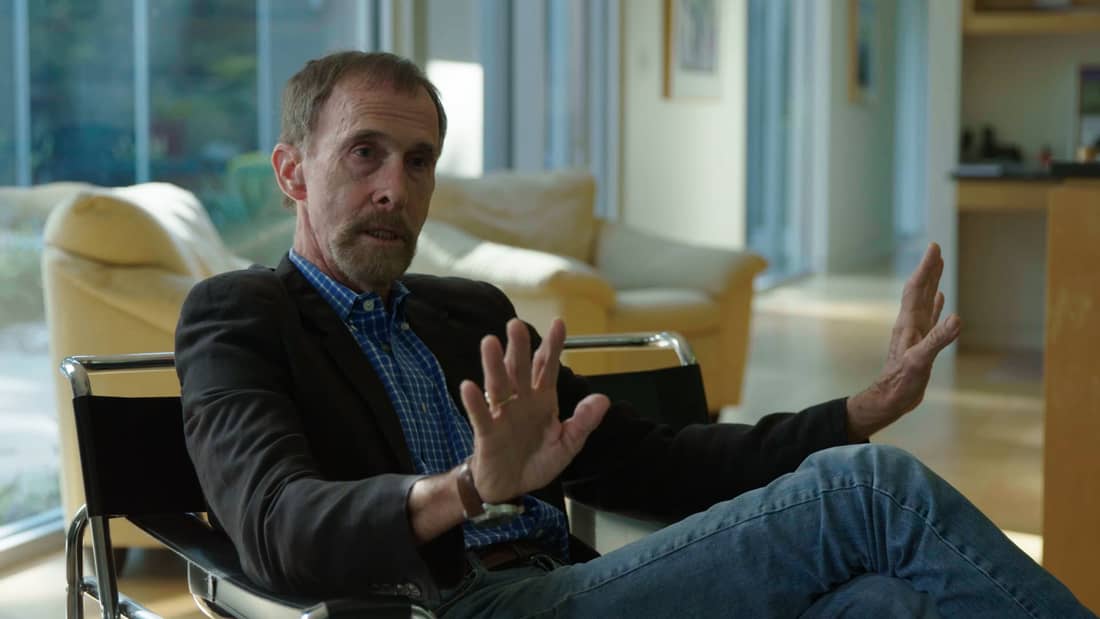
Leaving politics for now, and continuing on about design:
Blind variation and natural selection is, of course, the source of all adaptations in the biological realm, but my view is that it is also the source of all adaptations in the human and cultural realm, including all of the wonderful inventions and artifacts that we have produced. Blind variation and natural selection is the only process operating in the ontogeny and the development of the brain that producess behavior which is adaptative whether it means scratching an itch, or making a cup, or a pen, or an Apple computer. There’s no design anywhere; it’s all blind variation and natural selection.
Dan
Or that’s design and it’s just not a top-down designer. You see, what I think you are doing, and in a way, Richard too, is you are taking the folk ideology of design more seriously than you should. Look, the term “atom” means indivisible in Greek. So, we should say: “Oh! There aren’t any atoms. There aren’t any atoms.” No! Instead, we said: “Turns out, you can divide an atom.” … I think it is an easier pedagogical task to convince people that there’s design without a designer, design without an intelligent designer, than it is to convince them that there isn’t any design.
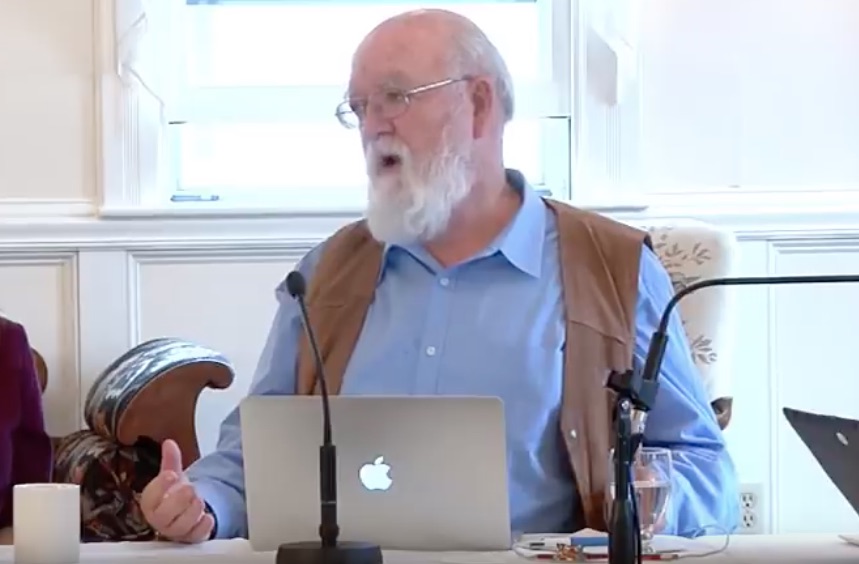
Alex
So, our objective should be to change everybody’s conceptual economy while leaving the tokens that they use in everyday speech—changing the meanings of the words?
Dan
My design stance works exactly as well on biology as on any artifact. And, biology is, in my terms, reverse engineering—reverse engineering the biosphere. If it is reverse engineering, then the biologists are helping themselves to design concepts left, right, and center. And we should say: look, there’s a perfectly naturalistic, non-intelligent-design sense of design that is everywhere evident in biology. … What Darwin did is showed how to naturalize the concept of design. And, biologically generated design is not second-rate design.
Alex
It’s the only kind of design.
Dan
It’s the only kind of design… I agree about that too.
All the things that people marvel about design is in evolutionary design—the very things that Paley talks about.4
Jerry
What is politically incorrect about using the word “adaptation” instead of “design.” It seems to me that the word “design” enables theism. So we should just replace it.
Dan
Notice that it is not a substantive debate. We all agree about the marvels of the biosphere, and we agree that there is a naturalistic explaination of them. The question is: should we be afraid that if we use the word “design,” we are giving a hostage to the creationists and the intelligent designers?
Nicholas
I hope that you scientists aren’t so concerned about politcal correctness and are concerned simply about clarity. Because I hope, we can figure out, even as laymen, if you are clear, how not to misconstrue what you are saying. I would urge that. Otherwise, you might actually muddy what you are saying, and that would be a shame.
(Ryan)
- Preplanned design and evolutionary design both generate real functioning solutions. Designoids are not solutions. They are apparent, not real design.
- It still seems useful to distinguish between preplanned and evolutionary design processes.
- Evolutionary design is not always better.
- I think Dan does a better job talking about design in his later talk at The Royal Institution.
- We should have noted earlier that the Schrödinger equation is not only a mathematical statement; it’s an empirically verified physical law (or at least a confirmed regularity of nature). Weinberg will remind us of this later , below.
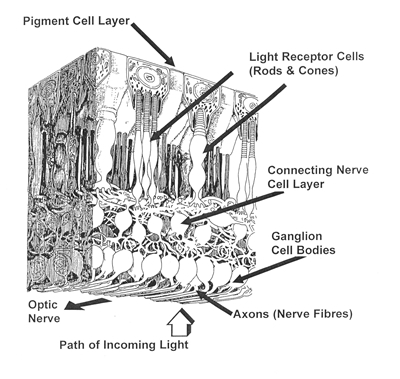
I want to go back to Alex’s response, or lack thereof, to Don: Everything is just fermions and bosons, but that is not the interesting discussion. The interesting question is: Are the laws of physics necessary and sufficient to derive everything known in the special sciences?
TODO: CONTINUE HERE
- Philip Anderson - “More is different”5
TODO…
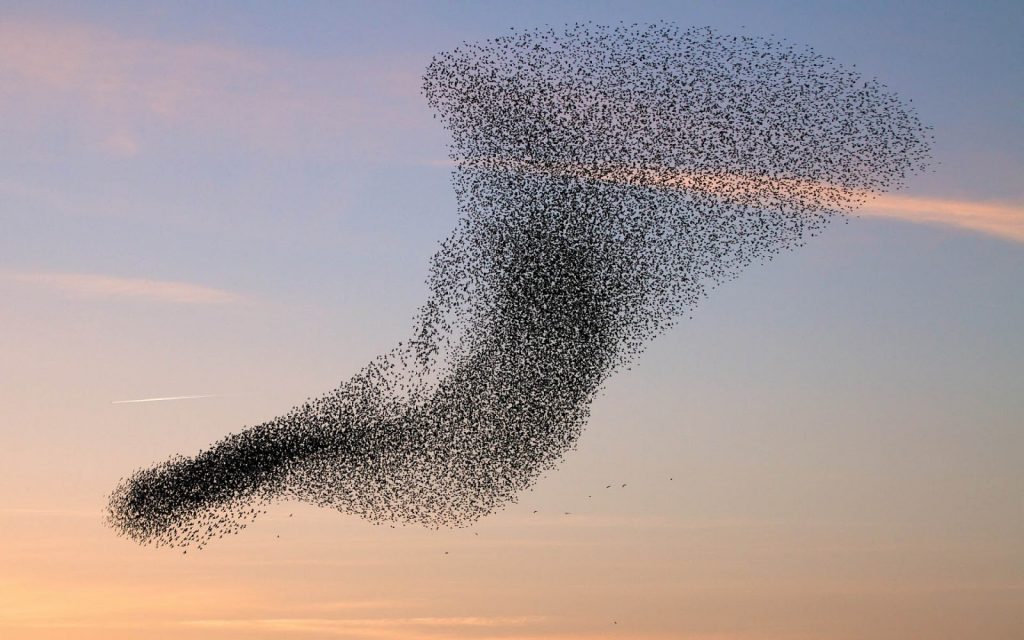
Steven
TODO…
Alex
It’s not just mathematics.
Steven
TODO…
Sean
They were here before us.
Steven
TODO.
Alex
TODO…
Steven
TODO…
Alex
TODO…
Steven
TODO…
Well, it’s the relations that are real.
TODO…
Don
TODO…
Imagine a universe that would have exactly the same description, in the ideal physics that no one has yet come up with, as the description we would give of this universe…
TODO… Part of me wants to tell Don to harden up and extrapolate…
Sean
TODO.
TODO…
Natural design has no foresight. Human design can look ahead and say, “If we go on polluting, in a century’s time, …,” and Nature doesn’t do that. Nature optimizes in the short term…
(Ryan)
TODO: highlight Richard’s point.
TODO: also point out that RL has the complication of learning long-term rewards.
Dan
TODO…
We are the first reason representers.
TODO: termites vs Gaudí.

I have a paper called “The Evolution of Reasons”6
What is this for?
TODO…
Jerry
TODO.
Dan
But we’re still going to use the word “function” and “what is it for?”
Alex
TODO…
TODO…
Sean
TODO.
Something is real if it forms an important part of a useful way of talking about the actual world.
Alex
So reality is contingent on utility?
Sean
Well, our description of reality is contingent on utility at the very least. I certainly could imagine talking about reality in way that never referred to the concept of the constitution of the United States and would not be mistaken in any way. I could just list all the fermions and bosons and have them evolve according to the Schrödinger equation; I would not be wrong, but I would be missing something really interesting, and I can’t come up with a better word than “useful.”
I could talk about the molecules in the atmosphere in our room right now atom-by-atom, kinetic theory. I would be missing the opportunity to describe some very useful regularities about the behavior of the atmosphere of this room, in terms of pressure and density and the laws of thermodynamics. And also, I have no right to think that the description in terms of atoms or fermions and bosons is the bottom one. And I don’t want the reality of atoms to depend on the year that I’m talking about it. So I think all the different levels have a claim to reality that is essentially equally strong.
Jerry
TODO.
Terrence
TODO.
Real teleology.
Alex
TODO.
Massimo
TODO.
Alex
TODO.
Jerry
TODO.
Sean
My working definition is that naturalism is the idea that the natural world is all that exists. The world is not divided into separate realms that would in any useful way be called natural and supernatural.
Simon
TODO.
Alex
TODO.
Rebecca
TODO.
Simon
TODO.
Alex
TODO.
David
TODO. What is explanation?
Alex
TODO.
Dan
TODO: pragmatism.
We are left with a sort of comical situation where the scientists are comfortable with little bit loosey-goosey, rough-and-ready sense of explanation. They know what they mean by real. They know what they mean by explanation. And you’re not letting them have that. You, who wants to honor science, are holding science to a higher and more unrealistic standard of definition than the scientists themselves are using.
Don
TODO.
Sean
TODO: give the last word.
Alex
TODO.

Ryan’s summary
- Alex put out some provacative claims, including:
- There is no teleology.
- The second law of thermodynamics generates the time asymmetries in physics. Further, all the asymmetries in physics are a result of the time asymmetries.
- The explanatory power of the special sciences are an epistemic thesis and not a metaphysical one, and represent cognitive limitations of humans and no fundamental facts about the organization of reality.
- In the last thesis about reductionism, Alex clearly goes too far. How ontologically eliminative should a naturalist be?
- Steven defends the multi-level realist.
- What is the metaphysics of abstract objects?
- Some tangents on design and designoid
- Are the laws of physics necessary and sufficient to derive everything known in the special sciences?
References
Davidson (2001).↩︎
Since there are 64 combinations of 4 nucleotides taken 3 at a time per codon and only 20 amino acids, the code is degenerate—more than one codon per amino acid, in most cases (see link).↩︎
See the analysis by Quote Investigator.↩︎
See William Paley on the “watchmaker analogy.”↩︎
Anderson (1972).↩︎
Dennett (2014).↩︎
